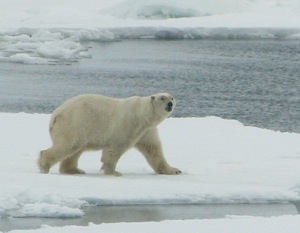
Because our charter at Climate Watch is to examine climate change from the California perspective, you don’t see a lot here about melting ice caps and imperiled polar bears. But Michael Krasny’s interview with Richard Ellis on KQED’s Forum program is well worth an hour of your time.
Ellis is the author of On Thin Ice: The Changing World of the Polar Bear (Random House, 2009) and it’s fair to say that he managed to stun Krasny with a declaration that the species is “doomed,” no matter what we might try to do to save it at this point. Ellis says there is already too much warming in the pipeline (what scientists call “committed” warming) to reverse the disintegration of the bears’ arctic habitat.
Polar bear populations have been a topic of persistent confusion, recently amplified in an op-ed piece written by former Alaska governor Sarah Palin for The Washington Post.
According to the advocacy group Polar Bears International, there is little room for doubt about the animal’s decline. The organization’s website breaks down the numbers, which point to a “scientifically documented decline in the best-studied population, Western Hudson Bay, and predictions of decline in the second best-studied population, the Southern Beaufort Sea.”
The PBI analysis goes on to explain that:
The Western Hudson Bay population has dropped by 22% since 1987. The Southern Beaufort Sea bears are showing the same signs of stress the Western Hudson Bay bears did before they crashed, including smaller adults and fewer yearling bears.
At the most recent meeting of the IUCN Polar Bear Specialist Group (Copenhagen, 2009), scientists reported that of the 19 sub-populations of polar bears, eight are declining, three are stable, one is increasing, and seven have insufficient data on which to base a decision. (The number of declining populations has increased from five at the group’s 2005 meeting.)
Regardless of whether you share the conclusions of Ellis and PBI about the future of the “poster child for global warming,” the Forum interview is a fascinating hour.
5 thoughts on “Author: Polar Bears Doomed No Matter What We Do”
Comments are closed.

Let’s see now. Was the most recent meeting of the IUCN Polar Bear Specialist Group (Copenhagen, 2009) the meeting that would not allow Canada’s expert on polar bears to attend the meeting because his data, I repeat data, did not support the political opinions put forth by the IUCN.
It appears all the build up heat is in the computer models and after the CRU exposure to public light we know how reliable those models are — not very if at all! Here is the latest on the arctic ice: http://www.ijis.iarc.uaf.edu/en/home/seaice_extent.htm
Where is the melting? Really?
It is unclear what Mr. Steele is trying to get at with reference to the seasonal cycles in sea ice extent from the AMSR-E data. The AMSR-E data, while valuable, only go back to 2002. Through combining SSM/I and SMMR satellite data with other information sources for earlier years, we have a decent record of Arctic sea ice extent going back to the early 1950s. The relevant issue is the long term decline in end-of-summer (September) ice extent evident in this record,with the extreme September minima of recent years (represented in the short AMSR-E record) serving as exclamation points. The observed rate of September ice loss exceeds expectations from nearly all climate models.
For those without a program, Mark Serreze is Director of the National Snow & Ice Data Center in Boulder, CO.
http://nsidc.org/
I’ll be posting a follow-up to the polar bear post, which will feature the responses of two scientists, including Serreze and another leading expert on the cryosphere.
Wow, Russ, slapped down by a leading scientist. You’ve arrived!